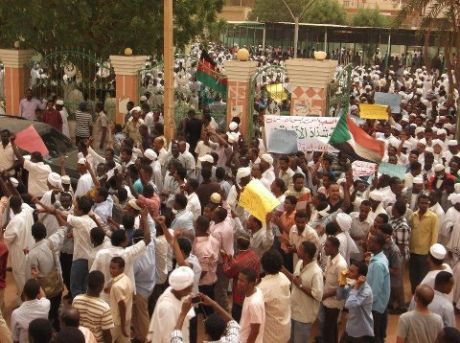News
You are here
Sudan: anti-austerity protests

August 23, 2012
Since June 2012 streets of Sudan have been packed with upset masses of people protesting against austerity, corrupt government and unjust laws.
The protests have been nourished by the revolutionary success across the Middle East during what is now being called the Arab Spring—which has spread across Africa.
The reality is that anger has been accumulating across Sudan since 2011, especially after the independence of Southern Sudan after two decades of bloody civil war. The north is still under the control of Omar Al-Bashir’s 23-year-old regime. The newly structured south gets three quarters of the country’s share of oil (thanks to US-driven partition). That leaves the north struggling for income to pay for imports. In addition, the South Sudanese troops invaded the Heglig oil field in April 2012 causing severe damage to the structure and leading to its closure. That resulted in another 20 per cent drop in oil revenue.
In an attempt to save the economy from the severe meltdown, Al-Bashir’s repressive government announced a new austerity plan on June 18, 2012. The new plan included an increase in consumer taxes, drop in wages, increase in lay-offs, and a hike in the price of the galloon of oil by 5 Sudanese pounds (from 8.5 to 13.5). The plan led to an decrease in fuel subsidies and an anger that further led the masses out to the streets.
On June 17, one day before the announcement of the new austerity plan, Sudanese students and other protesters erupted into the streets, fighting against the escalating prices of basic life sustaining goods. After the announcement of the austerity plan on June 18, students started their anti-austerity campaigns. Riot police rushed in with tear gas and live bullets in an attempt to clear the Sudanese streets. Police ran over peaceful protesters, but the force of the Sudanese police could not stop the protesters’ demands.
After few days of political unrest and violence, the Sudanese police spokesman, Al-Ser Ahmed, denied the use of excessive force. At the same time, the state media has repeatedly mentioned that Sudan’s police force has ordered an end to the protests, “immediately.”
The Sudanese people are still fighting for their rights, mainly in Omdurman, Khartoum, Burri, Daim, El-Obeid, Sennar and Bahri. Thousands have been arrested, while hundreds have been killed and injured (for an eye-witness account, visit this blog). The protests continue despite repression and global silence.
Section:
- Log in to post comments









